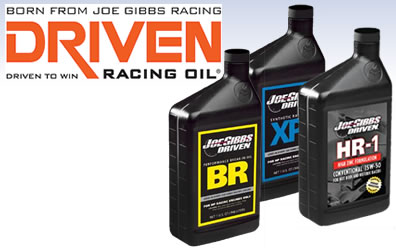4 Common Motor Oil Myths and Why They’re False

The guys on Discovery Channel’s Mythbusters have exposed some pretty incredible myths.
But when it comes to debunking some of the most common motor oil myths, you’d be hard pressed to find a better source than Driven Racing Oil. Formulated by the engine gurus at Joe Gibbs Racing, Driven Racing Oil motor oil and break-in oil have protected Joe Gibbs’ 9,000-rpm, flat-tappet engines for over 500 miles of competition.
Those same Joe Gibbs engine gurus recently set the record straight on four common motor oil myths:
Myth #1: Viscosity Equals Protection
As much as 70 percent of the wear on an engine occurs at start up, according to Driven Racing Oil.
A thinner, lower viscosity oil flows more easily right at startup and gets to those critical areas more quickly. Because of that, a thinner oil can actually do a great job of reducing the wear an engine sees when it is first cranked. Plus, that lower viscosity helps free up some horsepower because the oil pump doesn’t have to work as hard to move the oil throughout the engine.
While a thicker, higher viscosity oil does usually provide a stronger film surface to protect the bearings, advanced chemistry has enabled modern motor oils to provide superior protection with lighter weight viscosities.
Myth #2: More Additives Are Always Better
According to Lake Speed Jr. of Driven Racing Oil, there are chemicals in many common additives that actively counteract the effects of other additives.
That means these additives have to be carefully matched to ensure they will work with one another.
And more of one particular additive isn’t necessarily better either. For example, the popular Zinc additive ZDDP is recommended for use on engines with flat-tappet camshafts, because it provides a protective barrier between the cam lobes and lifters. However, more Zinc doesn’t mean more protection. Instead, an extra helping of Zinc only means the additive will last longer before it’s used up.
Myth #3: Reducing Friction = Reducing Wear
The common myth of breaking in a new engine is that new parts need to “wear” in.
“The problem with this myth is that people often don’t realize that there is a very real difference between reducing friction and reducing wear,” Speed said. “While it sounds like the same thing, it’s not. ZDDP is a great example. It is very important for the break-in process, especially if you are using a flat tappet camshaft, to use the right type and amount of ZDDP because it reduces wear. But ZDDP doesn’t reduce friction.”
Synthetic oils are designed to reduce friction, and your engine needs friction to get the ZDDP to activate and help “chemically” mate the parts without wearing out the parts during the break-in period. Low friction motor oils, especially synthetics, are designed to reduce friction which will substantially lengthen the amount of time required to break in an engine.
Speed says that a well-designed break-in oil prevents excessive wear while quickly mating the parts. This approach reduces wear and completes the break-in process faster.
Myth #4: Racing Oil is Always Better
Even if you have a high-horsepower engine built using a lot of racing components, that doesn’t mean an oil formulated for racing will be the best choice.
You must consider the application.
Since street engines—even high-horsepower engines—rarely go above part throttle, they don’t usually push oil temperatures high enough to boil off contaminants. Remember, racing oils contain very little detergent and are designed to be changed after every few races, so contaminants can build up quickly if you follow the standard 3,000-mile oil change rule for the street.. Eventually, these contaminants can damage the cylinder walls, leading to blow-by and poor oil control.
Lake Speed Jr. and the Driven Racing Oil team have a lot more to say about the “racing oil myth”—and the three other myths. Check out their full article for additional, expanded information.
SOURCE: DRIVEN RACING OIL.





So using a PAO based oil, with no petroleum in it sounds like the way to go. Why not try True Power Oil?
i change the oil in both of my vehicles once a year, usually around 20,000 on each, one has over 300,000 and still runes fine, cheapo 20w50
A secret I have found is the best of both worlds in a semi synthetic blend.. Thus getting the benefits of conventional and synthetic oils at variuod grades and manufacturers at a very reasonable cost.
I have delt with Lake on many occasions and projects. He is a great guy to deal with and knows his stuff when it comes to oil. Driven Racing Oils has some of the best products on the market and why we are a distributor and use it in all our engines. We are able to break in an engine quickly with the BR oil and switch right to synthetic after a very short period.
Alfano Performance
I’m a Castrol believer my dad used it and ive always used it . Never had an oil related failure. Far as im concerned Castrol 10/40 is the best..
I have just used Joe Gibbs break in oil in my S.B.F 347 with a flat tappet cam on the recommendation of my engine builder. Engine sounds great, no blow-by and cam has bedded in nicely. My engine builder told me, he has never had bad experience with breaking in an engine using Joe Gibbs products. Very reassuring.
i been using valvoline racing straight 50 weight for years in my 30 over 396 bbc seems to working well for me i use 10w30 quaker state in my 78 ford 150 302
Is there a difference in a high mileage velicle the oil you use different place want to use a high mileage oil so they can charge you more because of the oil they are using thanks for the info
I work in automotive and am ase certified in parts high mileage oil typically has additives to help with worn or leaking engines in vehicles with over 75,000 miles that’s not to say you should stop using another oil because of your mileage
My suggestion during the first 3,000 miles use conventional oil after that if you have a post 96 car use a regular synthetic oil with the oem recommended weight if older to use an oil with high zinc not a racing oil though
The other thing is to not use heavier weight oil or additives in your oil car manufacturers put a lot of time testing to see what works best in the engines heavier oils don’t always protect as good i would say if you leak oil bad enough to require a heavier weight oil you need to fix that leak! Because your going to likely spend more on oil than fixing a leak over time and it’s not good to the environment to have oil on the streets as it is washed in drains usually and not being disposed of properly
If anything a high mileage oil is best on cars with a bit of miles that burn a little oil generally less than a quart every oil change
What about 10w40 castellated magnates in a 360 mopar Amal block ( Jeep Zj 5.9 ) ??
OK, so I’ve run “break in oil”, some high dollar stuff that I don’t remember the brand, for about 3,000 miles in a .newly rebuilt 40 over 289 with a flat tappet cam in my 1965 mustang. It’s got a mild cam, headers, edelbrock dual plane intake, and a holley 4bbl What oil do I run now that will protect my camshaft? Or do I just use zinc additive with mobil1?
I’ve always used Rotella engine oil for break in on all the performance engines I’ve built over 35 years. Last big block chev I built it wiped out a cam lobe. Who knew they removed the Zinc from it. Installed another new cam and used Joe Gibbs break in oil , problem solved. It’s almost the same price as Rotella anyway.
they didnt remove it, its lower but not removed. a myth
EXXON-MOBIL says…in writing that there is zero difference in the coefficient of friction in synthetic and dino oils unless one of them is an energy conserving oil. Synthetic oil also does not lengthen the break in process. You can believe these guys or you can believe the people who engineered the stuff.
Remember that Myth Busters are the guys who said Carlos Hathcock did not kill the NCA sniper who was sent to kill him by putting a 30-06 round through the scope of the NVA.
If the statement in this article about break in is true….why do Porsche, M-B, GM and others use Mobil-1 in their new engines…..engines that do not require a break in…..back when all engines had flat tappet cams the cam was run in at the factory.
I’ve,be been building engines for 40+ years, Gas,Diesel,Rotary, Air Cooled, High Performance, Racing,Heavy Equipment, Marine,,,,, You name it!(except Turbines)
And never used”Break-In” Oil. My choice has been 15-40 Diesel Engine Oil.Preferably the Shell Rotella, Texaco Ursa or usually the Walmart Brand “SuperTech” 15/40.When I do the assembly or any moving parts, I always use a mixture of STP Oil Treatment & 15/40.Never had a problem, Never lost an Engine. The only Engine I use straight weight Oil is”Detroit Diesel “{53/71/92,etc} either 30w or 40w ,the old 2 cycle diesels. In the Navy,I took a complete course (school) on Engine Lubricants,, Oil Purifier’s, Recycling,,,Those Ship Engine’s you never Change Oil !!!(or Locomotive’s)
You Purify via a Centrifuge.So you can see why I stick to my routine,,, And NO I don’t believe in Synthetic Oils /Synthetic Blends, let’s face it , An Oil Purifiers can recycle Oil, (which there is nothing wrong with recycled Oil) but they cannot separate synthetic from conventional Oil.That’s a Fact! So when you buy the” Generic Brand ” you’re basically getting a Synthetic Blend. If interested feel free to contact me anytime.For more information & suggestions! Happy Motoring!
MOTORHEAD~ TY{ tygrossfz@aol.com}
Thanks for pointing out that a lower viscosity oil will flow more easily at startup and help prevent wear on the engine. My husband and I just got a new car, and we really want to keep it in the best shape possible. We’ve been doing some research into which motor oil will be the best for it. I appreciate you pointing out that you should choose lower viscosity oil to reduce engine wear.